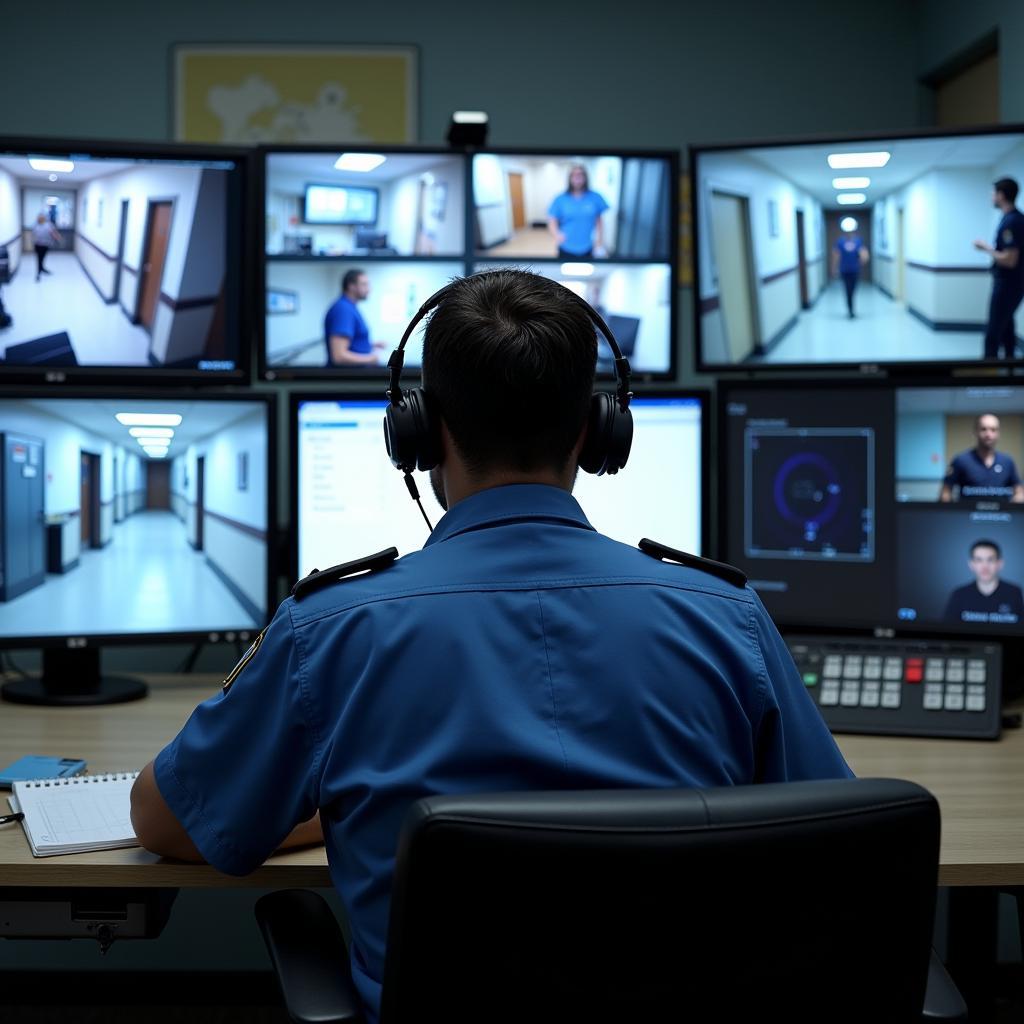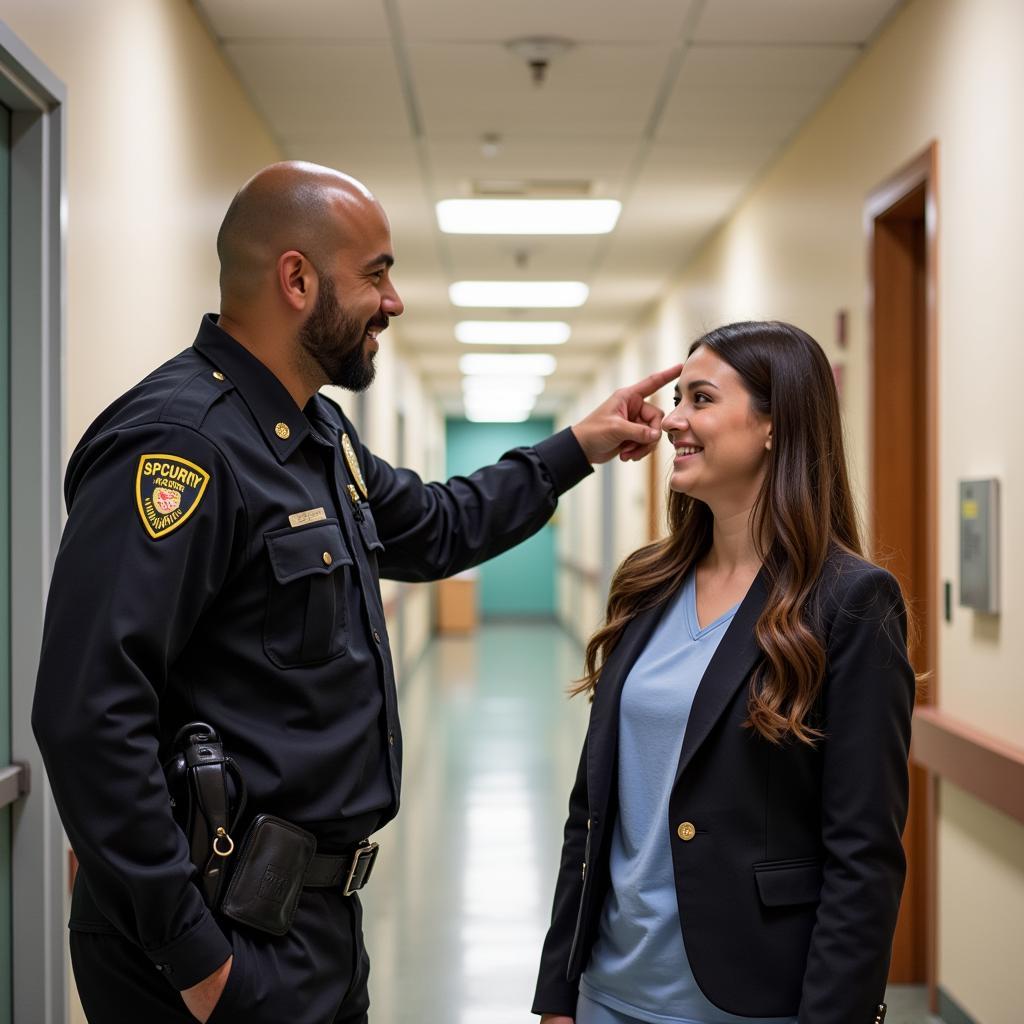Hospital Security Guard Responsibilities encompass a wide range of duties, crucial for maintaining a safe and secure environment for patients, staff, and visitors. These dedicated professionals are the first line of defense against threats and play a vital role in ensuring the smooth operation of the healthcare facility. From patrolling the premises to responding to emergencies, their vigilance and quick thinking are essential for protecting lives and property.
Understanding the Core Responsibilities of a Hospital Security Guard
A hospital security guard’s primary responsibility is to prevent crime and maintain order within the hospital grounds. This includes patrolling the facility, monitoring surveillance cameras, and responding to alarms. They must be vigilant, observant, and able to identify potential security risks. Effective communication skills are also crucial, as they often interact with patients, visitors, and staff, providing assistance and directions. Their presence acts as a deterrent, contributing significantly to the overall safety and security of the hospital environment.
Another critical aspect of hospital security guard responsibilities involves access control. They monitor entrances and exits, ensuring only authorized individuals enter restricted areas. This can involve checking identification, verifying visitor passes, and enforcing hospital policies. Their role in access control helps protect sensitive information and equipment, as well as maintaining patient privacy. They also play a crucial role in managing traffic flow and parking, ensuring smooth operations within the hospital complex.
Key Duties and Tasks of Hospital Security Guards
Hospital security guards perform a variety of tasks, including:
- Patrolling: Regularly patrolling the hospital’s interior and exterior to deter crime and identify potential security breaches.
- Monitoring Surveillance: Observing security cameras and responding to any suspicious activity.
- Responding to Emergencies: Providing immediate assistance during medical emergencies, fires, or security incidents. This may involve coordinating with medical personnel, law enforcement, or fire departments.
- Access Control: Managing access to restricted areas, ensuring only authorized personnel enter.
- Incident Reporting: Documenting all incidents, observations, and activities in detailed reports.
- Enforcing Hospital Policies: Upholding hospital regulations and ensuring compliance from patients, visitors, and staff.
 Hospital Security Guard Monitoring CCTV Footage
Hospital Security Guard Monitoring CCTV Footage
Specialized Skills and Training for Hospital Security
Hospital security guards require specialized training to effectively handle the unique challenges of a healthcare setting. This often includes training in de-escalation techniques, conflict resolution, and basic first aid. They also need to be familiar with HIPAA regulations to protect patient confidentiality. Furthermore, training on handling disruptive or aggressive individuals is essential, as they may encounter patients experiencing emotional distress.
What training do hospital security guards need?
Hospital security guards typically receive training in areas such as:
- De-escalation techniques
- Conflict resolution
- Basic first aid and CPR
- HIPAA regulations
- Handling aggressive individuals
- Emergency response procedures
These skills are crucial for ensuring a safe and secure environment within a hospital.
“Effective communication and de-escalation skills are paramount for hospital security guards. They are often the first point of contact in challenging situations and must be able to diffuse tensions while maintaining a calm and professional demeanor,” says John Smith, Head of Security at City General Hospital.
 Hospital Security Guard Assisting a Visitor
Hospital Security Guard Assisting a Visitor
The Importance of Hospital Security in Healthcare
Hospital security plays a vital role in creating a safe and secure environment for everyone within the healthcare facility. Their presence not only deters crime but also provides a sense of safety and reassurance to patients, staff, and visitors. By ensuring order and enforcing hospital policies, they contribute significantly to the smooth operation of the hospital and allow medical professionals to focus on providing quality patient care.
“A robust security presence is essential for any hospital. It’s not just about preventing crime, it’s about creating a healing environment where everyone feels safe and protected,” adds Maria Garcia, RN, Chief Nursing Officer at Mercy Hospital.
Conclusion
Hospital security guard responsibilities are diverse and demanding, requiring a unique blend of skills and training. Their vigilance, professionalism, and commitment to safety play a crucial role in protecting lives, maintaining order, and ensuring the smooth operation of the healthcare facility. A well-trained and dedicated security team is a valuable asset to any hospital, contributing significantly to the overall well-being of patients, staff, and visitors.
FAQ
- What are the basic requirements to become a hospital security guard?
- What is the average salary of a hospital security guard?
- What are the career advancement opportunities for hospital security guards?
- Do hospital security guards carry weapons?
- What type of training is required for hospital security guards?
- What are the most common challenges faced by hospital security guards?
- How can I contact the security department at San Jose Hospital?
Need assistance? Contact us at Phone Number: 02437655121, Email: [email protected] or visit us at 298 Cau Dien Street, Minh Khai, Bac Tu Liem, Hanoi, Vietnam. We have a 24/7 customer service team.